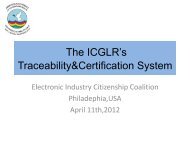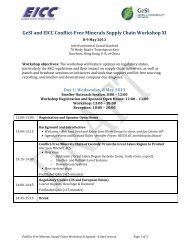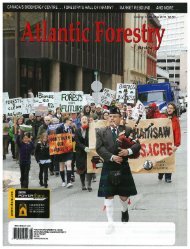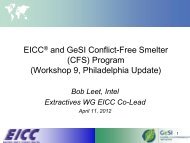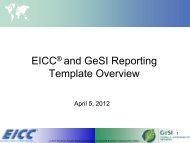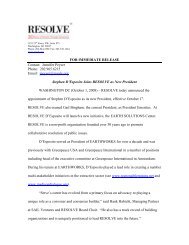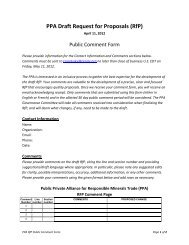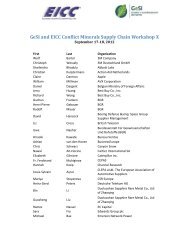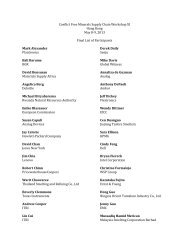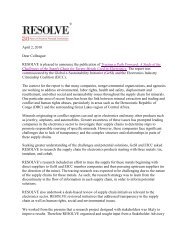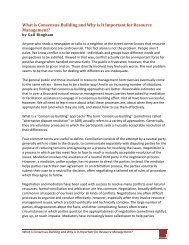Toward SuSTainabiliTy: The roleS and limiTaTionS of ... - Resolve
Toward SuSTainabiliTy: The roleS and limiTaTionS of ... - Resolve
Toward SuSTainabiliTy: The roleS and limiTaTionS of ... - Resolve
You also want an ePaper? Increase the reach of your titles
YUMPU automatically turns print PDFs into web optimized ePapers that Google loves.
Chapter 2: Actors – Government 34Government as FunderPublic funding <strong>and</strong> tax breaks are other powerfulgovernment tools that can influence certification.As mentioned previously, the governments <strong>of</strong>Austria, Switzerl<strong>and</strong>, <strong>and</strong> the Netherl<strong>and</strong>s provideddirect funding to the FSC at a crucial pointin its development, <strong>and</strong> the U.S. governmentprovided funding for the development <strong>of</strong> laborst<strong>and</strong>ards in the apparel industry. In the environmentalarena, the U.S. also provided federalfunding to support the development <strong>of</strong> LEEDst<strong>and</strong>ards for green building construction in itsearly years (Smith & Fischlein, 2010). In addition,the IDH (a Dutch government-funded sustainabletrade initiative), together with the WWF, founded<strong>and</strong> has provided substantial financing for theAquaculture Stewardship Council, which is developingst<strong>and</strong>ards for aquaculture-grown fish. 5Governments can also provide financial assistanceto producers seeking to get certified.Belgium, for example, provides financial supportto producers <strong>and</strong> traders in developing countriesthat get certified to the Fairtrade LabellingOrganizations’ st<strong>and</strong>ards, or are members <strong>of</strong>the International Fair Trade Association. Rw<strong>and</strong>ahas financed the costs <strong>of</strong> certification to the EastAfrican Organic Products St<strong>and</strong>ard for severalexport companies, <strong>and</strong> provided 100 percent taxbreaks on the purchase <strong>of</strong> equipment used fororganic farming (Carey & Guttenstein, 2008).<strong>The</strong> Tuscany Regional Government supportssmall <strong>and</strong> medium-sized enterprises seeking tobecome certified to the SA8000 st<strong>and</strong>ard forsocial accountability by paying up to 50 percent <strong>of</strong>the costs <strong>of</strong> certification <strong>and</strong> providing tax breakson national insurance <strong>and</strong> regional tax payments(Carey & Guttenstein, 2008). And, for a time in2007 <strong>and</strong> 2008, the government <strong>of</strong> Cote d’Ivoireexempted certified cocoa from export duties (personalcommunication, Rainforest Alliance staff).Government as Opinion ShaperGovernment endorsement <strong>of</strong> certification systemsmay help add to their credibility <strong>and</strong> legitimacy asa solution to environmental or social problems.Conceptual SupportGovernments have given <strong>of</strong>ficial support forprivate certification through international intergovernmentalbodies that have incorporated thissupport into key documents. For example, theUnited Nation’s program <strong>of</strong> action for sustainabledevelopment, Agenda 21, calls for governmentsto encourage ecolabels as a way to influenceconsumer choice. Similarly, the Commission onSustainable Development <strong>and</strong> the Organisationfor Economic Co-operation <strong>and</strong> Developmentboth identify ecolabel programs as an importanttool in several <strong>of</strong> their policy papers (Müller,2002). More indirectly, Sweden’s requirement thatthe forest industry promote ecological as well aseconomic goals seems to have increased industrysupport for the FSC as a way <strong>of</strong> meeting governmentrequirements (Cashore, et al., 2004).Marketing SupportGovernments’ considerable outreach capabilitiescan also advance certification systems. Forexample, Tuscany undertook a concerted publicawareness <strong>and</strong> information campaign that facilitatedthe rapid uptake <strong>of</strong> social accountabilityst<strong>and</strong>ards by its regional businesses. <strong>The</strong> government<strong>of</strong> Rw<strong>and</strong>a used its convening power to bringtogether civil society organizations <strong>and</strong> create theRw<strong>and</strong>an organic agriculture movement, whichled to the development <strong>of</strong> the East Africa OrganicProducts St<strong>and</strong>ard (Carey & Guttenstein, 2008).Also, the U.S. Department <strong>of</strong> Agriculture’s organicst<strong>and</strong>ards program is run out <strong>of</strong> the department’sAgricultural Marketing Service, as the st<strong>and</strong>ardsare considered marketing st<strong>and</strong>ards (as opposedto safety st<strong>and</strong>ards, for example).5 www.idhsustainabletrade.com/what-we-do <strong>and</strong> www.ascworldwide.org/index.cfm?act=faq.faq&lng=1<strong>Toward</strong> Sustainability: <strong>The</strong> Roles <strong>and</strong> Limitations <strong>of</strong> Certification



